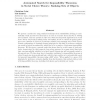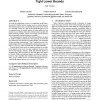587 search results - page 12 / 118 » On the Relative Sizes of Learnable Sets |
JAIR
2011
13 years 2 months ago
2011
We present a method for using standard techniques from satisfiability checking to automatically verify and discover theorems in an area of economic theory known as ranking sets o...
PODS
2006
ACM
14 years 7 months ago
2006
ACM
We study the randomized version of a computation model (introduced in [9, 10]) that restricts random access to external memory and internal memory space. Essentially, this model c...
TCS
2008
13 years 7 months ago
2008
We investigate the complexity of finding Nash equilibria in which the strategy of each player is uniform on its support set. We show that, even for a restricted class of win-lose ...
NIPS
2008
13 years 9 months ago
2008
Stochastic relational models (SRMs) [15] provide a rich family of choices for learning and predicting dyadic data between two sets of entities. The models generalize matrix factor...
KDD
2003
ACM
14 years 7 months ago
2003
ACM
Data Mining with Bayesian Network learning has two important characteristics: under broad conditions learned edges between variables correspond to causal influences, and second, f...


